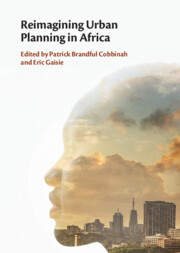Book contents
- Reimagining Urban Planning in Africa
- Reimagining Urban Planning in Africa
- Copyright page
- Contents
- Contributors
- Foreword
- Preface
- Acknowledgements
- Abbreviations
- Part I Understanding Sustainable Urban Planning in Africa
- Part II Case Studies on Urban Planning in African Countries
- 7 The Proliferation of Gated Communities
- 8 History, Practices, Challenges and Opportunities of Urban Planning in Zimbabwe
- 9 The Evolution and Nature of Urban Planning in Nigeria
- 10 Rethinking Urban Planning and Informal Settlement Upgrading
- 11 Urban Planning Challenges and Slum/Informal Housing Formation in Ogun State, Nigeria
- 12 The Proliferation of Slums in Cameroon
- 13 An Overview of Urban Planning in Tanzania
- Part III Sustainable Urban Planning in Africa
- Index
- References
9 - The Evolution and Nature of Urban Planning in Nigeria
from Part II - Case Studies on Urban Planning in African Countries
Published online by Cambridge University Press: 07 December 2023
- Reimagining Urban Planning in Africa
- Reimagining Urban Planning in Africa
- Copyright page
- Contents
- Contributors
- Foreword
- Preface
- Acknowledgements
- Abbreviations
- Part I Understanding Sustainable Urban Planning in Africa
- Part II Case Studies on Urban Planning in African Countries
- 7 The Proliferation of Gated Communities
- 8 History, Practices, Challenges and Opportunities of Urban Planning in Zimbabwe
- 9 The Evolution and Nature of Urban Planning in Nigeria
- 10 Rethinking Urban Planning and Informal Settlement Upgrading
- 11 Urban Planning Challenges and Slum/Informal Housing Formation in Ogun State, Nigeria
- 12 The Proliferation of Slums in Cameroon
- 13 An Overview of Urban Planning in Tanzania
- Part III Sustainable Urban Planning in Africa
- Index
- References
Summary
This chapter outlines the epoch of urban planning evolution in Nigeria. It highlights and describes the nature of urban planning, the roles of planners, urban planning challenges, and prospects of urban planning in Nigeria. Urban planning in Nigeria evolved before colonialism. As the country transited from the colonial era to Independence, urban planning also went through significant transformation. It became an essential tool to facilitate orderly spatial arrangement of the various land uses with emphasis on promoting functional relationships among the various land uses so as to ensure harmony in the development of the built environment. This is considered a common good due to its importance for economic and socio-cultural development. The method of investigation is essentially an analysis of secondary data obtained from published journal articles and reports. Over the past years, urban planning has evolved as a discipline and an institutionalised profession. It has witnessed the enactment of many planning laws. However, the contention in this chapter is that, even with the presence of well-formulated urban planning, its future is far from bright. Urban planning in Nigeria lacks commitment from the government.
- Type
- Chapter
- Information
- Reimagining Urban Planning in Africa , pp. 143 - 164Publisher: Cambridge University PressPrint publication year: 2023



